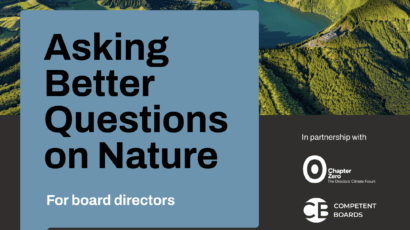
Audit Committee Dialogue: Integrating nature-related financial disclosures
With expert input from A4S, the session focused on nature-related risks and opportunities, the links between nature and climate, and evolving nature-related reporting requirements including the Taskforce on Nature-related Financial Disclosures (TNFD). These topics are of growing importance to strategic level discussions and therefore to audit committees’ governance oversight. The key themes and top tips that arose from the conversations are captured below.
1. Nature-related risks and opportunities
Broadening understanding of climate risks: Nature is an emerging topic in corporate governance discourse. For many organisations, getting to grips with how nature presents both risk and opportunity requires a broadening of the understanding of risk. There is significant opportunity for more targeted risk opportunity analysis on nature to inform organisations’ overall climate risk management. Attendees identified audit committees’ Terms of Reference (TOR) as a key opportunity to integrate nature-related considerations into governance practices. Considering the unpredictability of certain nature-related risks such as natural disasters, regular review of organisational responsibilities and deliverables may enable a more consistent and clearer remit for audit committees as risk contexts continue to evolve.
Strategic accountability: Alongside developing committee-level knowledge, attendees agreed that there is scope to better engage with management on its strategic understanding of nature-related risks and opportunities. Whilst the audit committee should understand nature-related risks, it should also ensure that senior management have sufficient technical knowledge and expertise to incorporate nature-related risks into decision making—and the audit committee must hold management accountable for these decisions.
Double materiality: As set out in the TNFD, organisations have dependencies on nature (i.e. the ways in which organisations rely on environmental assets and ecosystem services) and impacts on nature (i.e. the ways in which organisations can have positive or harmful effects on nature). Strategic conversations should consider how dependencies and impacts on nature can lead to nature-related risks and opportunities. In line with double materiality thinking, audit committees can help identify where there are vulnerabilities within an organisation’s business model. Attendees offered examples of various nature-related impacts to business including natural disasters and supply chain disruptions. Regardless of the size or type of organisation, the changing frequency and severity of nature-related impacts presents significant risks to value chains and should be prioritised accordingly.
Stakeholder expectations: It was suggested that, to some extent, an organisation’s stance on nature boils down to stakeholder expectations. These expectations are likely to vary based on the organisation’s sector and the makeup of its stakeholders. As the wider nature discussion continues to develop, audit committees can push for more direct consideration of how action on nature, and any associated trade-offs, ultimately serves the needs of the organisation’s stakeholders. This is critical to maintaining the integrity of decision-making processes and business performance.
2. Nature and climate
Defining nature at the strategic level: Attendees agreed that the climate agenda is well-established across organisations, but that consideration of nature and its interdependencies with the organisation are less well-known. Considering the current lack of consensus around nature risk management, a necessary starting point for organisations is defining what ‘nature’ is at the strategic level. Attendees spoke of confusion around what organisations determine as a nature risk, versus a climate risk. Greater precision in understanding and defining nature can lead to more certainty in the action needed within an organisation’s risk context. As it has become commonplace for organisations to consider the climate risks of their activities, there is a growing need to expand this thinking to consider nature risks in the same way.
Making the case for nature: It is increasingly critical that boards consider how nature risks can undermine strategic objectives. There are strong business reasons for taking steps to address nature-related risks and take advantage of opportunities in this space. Although many organisations are currently at an early stage of articulating the business case for taking action on nature, nature-related governance is a logical and sustainable strategy for growth. The risks stemming from organisations’ dependencies and impacts on nature are particularly critical to building the business case. Related considerations such as stakeholder expectations, regulation coming into force at a potentially rapid pace, as well as potential cost savings from nature-related action, can help frame strategic conversations around more immediate decisions that can be made within an organisation’s portfolio of assets. This would then help to establish an effective business case. The business case must backed up with sufficient data on the scale and scope of the nature-related opportunities, which was identified as a current limitation for audit committees.
Understanding the policy landscape: Attendees agreed that government intervention is critical to developing the nature agenda amongst the business community. Real progress on nature action cannot happen in isolation, and the opportunity for public and private sector partnership in investing and delivering this progress is significant.
The planning system was identified as a major area for partnership engagement, as planning constraints can present barriers to delivering organisations’ nature responses. Attendees showed an interest in understanding opportunities to utilise forms of government support where these exist, while also pushing for greater clarity on the government’s remit versus that of organisations’ in addressing nature-related issues facing the general public.
Nature-related regulation, both current and future, was identified as a key driver of action. Attendees pointed to the introduction of carbon pricing regulation, which has had a visible impact on businesses’ decision making, and the potential for a similar form of nature pricing regulation coming into effect. Audit committees can contribute to tracking policy developments to ensure that the proper controls are in place to meet changing nature-related regulatory requirements, as and when they emerge.
3. Reporting requirements and TNFD
Integrated reporting: General consensus found that organisations are further along in their implementation of the Task Force on Climate-related Financial Disclosures (TCFD) requirements than they are with TNFD. It was suggested that there are learnings to be taken from existing work on TCFD implementation and a real potential for, and benefit to, developing an integrated reporting approach. A useful starting point could be determining where there is overlap between the frameworks and identifying actions that organisations can take which meet requirements for both. This may help streamline more comprehensive and coordinated disclosure efforts.
Governance of nature-related data: A comparison was made between identifying nature-related dependencies and impacts within an organisation’s value chain and scope 3 emissions reporting. For some organisations, progress on nature-related issues may be taking place as part of their supply chain management and transition planning. Concern about additional nature-related reporting complexity can be eased through ensuring that better mechanisms for accessing supply chain (‘scope 3’) data, and governance over this, are in place. Strategic integration of nature within existing governance frameworks may help prevent nature-related risks from being siloed, and audit committees can help clarify opportunities to apply a nature-specific lens to existing governance practices across the supply chain.
Nature-related expertise: Research from the World Benchmarking Alliance suggests that globally only 2% of companies have boards that can demonstrate the relevant expertise on topics such as nature and biodiversity. To ensure effective governance and oversight, audit committees should push for the prioritisation of developing the organisation’s technical knowledge and expertise on nature. Attendees identified a lack of familiarity with nature-related impacts, risks and opportunities as one of the biggest barriers to action, therefore it is important to assess the training needed at board level. In the meantime, attendees agreed that, despite limitations in expertise, it is still possible to make progress in identifying nature-related risks and opportunities.
Encouraging action on nature from within: In many cases, action on nature within organisations is inspired and/or led by passionate employees who have an interest in, and the initiative to, implement nature-positive business practices. Audit committee members can play a supportive role in creating the conditions for employees to pursue nature-related initiatives and support this strategically. This may help create an environment for knowledge sharing and incremental change.
Top tips from the discussion
| Top Tips | Description |
| Consider your organisation’s strategic positioning on nature | Assess to what extent your organisation is already considering nature-related risks and opportunities. Audit committees can focus on finding the levers and connection points during ongoing conversations around other strategic priorities including climate transition planning. In acknowledging the challenge boards face in balancing the range of issues that exist, look to understand what nature means for your organisation at a strategic level, and how it fits in as a business value. |
| Focus on nature-related horizon scanning | Prioritise long-term strategic thinking on nature and its impacts on business sustainability. Consider the potential legal and regulatory impacts of changing nature-related market expectations, as seen with the introduction of TNFD reporting. Audit committees should ensure that the design and delivery of strategic risk management decisions are receptive to the changing needs of stakeholders and investors as nature-related issues become more critical. |
| Address gaps in expertise | Focus on determining existing expertise and capacity to address nature-related issues. Audit committees play an important role in ensuring these risks and opportunities are understood at the strategic level and should encourage executives to engage in conversations around training and upskilling to align with nature-focused governance. |
| Consider nature-related data needs for effective governance reporting | Identify the data needed to effectively make the business case for nature. Emphasis on data may help guide nature-related strategic objectives and targets. Audit committees should push for clarity on key areas of nature-related vulnerability. Promote integration of nature-related risks and opportunities into materiality assessment, as this may help build the evidence base for investing in nature-related governance. |
Recommended Reading
Read More
Explore the key takeaways from our previous dialogues with A4S:
Session 1: External reporting, internal audit, assurance and controls
Session 2: Transition planning and the changing sustainability reporting landscape
This event summary was developed in collaboration with Accounting for Sustainability (A4S) and the Centre for Climate Engagement.



